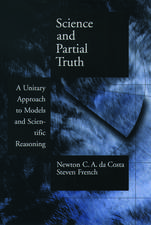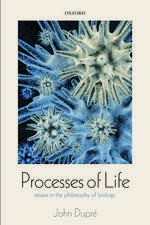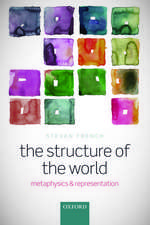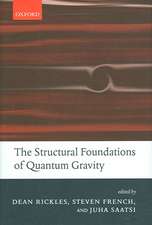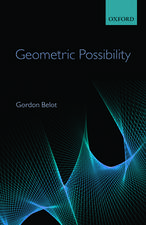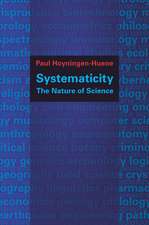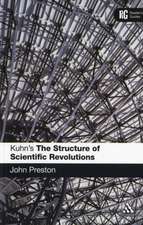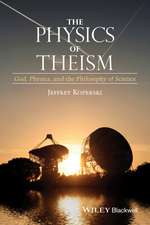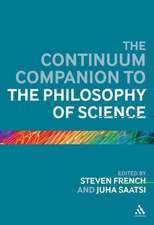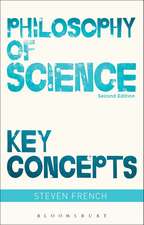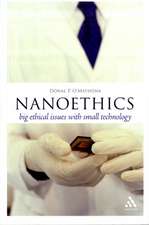Science: Key Concepts in Philosophy: Key Concepts in Philosophy
Autor Steven Frenchen Limba Engleză Paperback – 8 aug 2007
| Toate formatele și edițiile | Preț | Express |
|---|---|---|
| Paperback (1) | 176.52 lei 6-8 săpt. | |
| Bloomsbury Publishing – 8 aug 2007 | 176.52 lei 6-8 săpt. | |
| Hardback (1) | 886.96 lei 6-8 săpt. | |
| Bloomsbury Publishing – 8 aug 2007 | 886.96 lei 6-8 săpt. |
Din seria Key Concepts in Philosophy
-
 Preț: 126.55 lei
Preț: 126.55 lei -
 Preț: 126.85 lei
Preț: 126.85 lei - 14%
 Preț: 164.50 lei
Preț: 164.50 lei -
 Preț: 171.44 lei
Preț: 171.44 lei - 12%
 Preț: 215.51 lei
Preț: 215.51 lei -
 Preț: 186.44 lei
Preț: 186.44 lei -
 Preț: 145.48 lei
Preț: 145.48 lei -
 Preț: 186.44 lei
Preț: 186.44 lei -
 Preț: 465.05 lei
Preț: 465.05 lei -
 Preț: 236.19 lei
Preț: 236.19 lei -
 Preț: 158.82 lei
Preț: 158.82 lei - 8%
 Preț: 145.01 lei
Preț: 145.01 lei -
 Preț: 171.44 lei
Preț: 171.44 lei - 17%
 Preț: 216.44 lei
Preț: 216.44 lei -
 Preț: 170.51 lei
Preț: 170.51 lei -
 Preț: 183.66 lei
Preț: 183.66 lei -
 Preț: 176.07 lei
Preț: 176.07 lei -
 Preț: 215.79 lei
Preț: 215.79 lei -
 Preț: 236.19 lei
Preț: 236.19 lei -
 Preț: 187.40 lei
Preț: 187.40 lei -
 Preț: 185.29 lei
Preț: 185.29 lei - 14%
 Preț: 144.75 lei
Preț: 144.75 lei - 25%
 Preț: 95.63 lei
Preț: 95.63 lei - 22%
 Preț: 100.45 lei
Preț: 100.45 lei - 27%
 Preț: 307.78 lei
Preț: 307.78 lei - 25%
 Preț: 95.12 lei
Preț: 95.12 lei - 28%
 Preț: 307.04 lei
Preț: 307.04 lei - 23%
 Preț: 98.69 lei
Preț: 98.69 lei - 24%
 Preț: 96.88 lei
Preț: 96.88 lei
Preț: 176.52 lei
Preț vechi: 205.86 lei
-14% Nou
Puncte Express: 265
Preț estimativ în valută:
33.78€ • 36.68$ • 28.38£
33.78€ • 36.68$ • 28.38£
Carte tipărită la comandă
Livrare economică 22 aprilie-06 mai
Preluare comenzi: 021 569.72.76
Specificații
ISBN-13: 9780826486554
ISBN-10: 082648655X
Pagini: 172
Dimensiuni: 138 x 216 x 13 mm
Greutate: 0.23 kg
Editura: Bloomsbury Publishing
Colecția Continuum
Seria Key Concepts in Philosophy
Locul publicării:London, United Kingdom
ISBN-10: 082648655X
Pagini: 172
Dimensiuni: 138 x 216 x 13 mm
Greutate: 0.23 kg
Editura: Bloomsbury Publishing
Colecția Continuum
Seria Key Concepts in Philosophy
Locul publicării:London, United Kingdom
Caracteristici
Key Concepts is a strongly branded and heavily promoted series that will - alongside the Reader's Guides and Guides for the Perplexed - clearly identify Continuum as a major publisher of undergraduate Anglo-American philosophy books.
Cuprins
Chapter 1: Introduction Chapter 2: Discovery - Flash of Genius or Careful Observation Chapter 3: Discovery - Heuristic Moves Chapter 4: Evidence - Verification and Falsification Chapter 5: Evidence - There's More to Seeing Than Meets the Eye Chapter 6: Evidence - The Secret Life of the Experiment Chapter 7: Realism - The Ultimate Argument Chapter 8: Realism - The Role and Function of Theories Chapter 9: Independence - Science as Social Activity Chapter 10: Independence - 'Facts' and 'Truth' Chapter 11: Where Does the Philosophy of Science Go From Here?
Recenzii
'The book consists of ten chapters, each of which segues clearly into the next...There are four Study Exercises which probe students' understanding of the material and challenge them to think about further issues associated with the material. These questions could serve as a starting point for a classroom discussion, or even as potential topics for student essays...French takes a conversational and light-hearted tone, so that the prose is more engaging for non-scholars than many other introductions to philosophy of science...For graduate students in other philosophical fields, this text could prove useful as a quick introduction to or refresher for some core ideas in philosophy of science.' Holly Andersen, University of Pittsburgh, Metascience
"In this volume, the author provides a succinct and approachable introduction to the field of philosophy of science. The book is written without assuming its readers have any philosophical training. Its style is casual, with plenty of examples and humor yet, importantly, Science gets across the technical details of some of the most central and influential philosophical positions, concepts, and arguments of the field. Because it is both short and extremely easy to read, this volume provides ideal supplementary material for those engaging the primary textbooks of this field for the first time. I have used it more than once for an introductory course in the philosophy of science, and it has worked well in this role. For my students, this book made for a welcome and helpful contrast to those volumes in terms of tone and approachability. Although other more cumbersome textbooks force instructors to structure their courses in a certain way, French's publication instead complements a course structured by primary works. In short, Science is an admirably concise and accessible basic introduction to the philosophy of science, one which enables its readers to go on to tackle more esoteric and dense primary philosophical textbooks." The Quarterly Review of Biology, September 2009
"In this volume, the author provides a succinct and approachable introduction to the field of philosophy of science. The book is written without assuming its readers have any philosophical training. Its style is casual, with plenty of examples and humor yet, importantly, Science gets across the technical details of some of the most central and influential philosophical positions, concepts, and arguments of the field. Because it is both short and extremely easy to read, this volume provides ideal supplementary material for those engaging the primary textbooks of this field for the first time. I have used it more than once for an introductory course in the philosophy of science, and it has worked well in this role. For my students, this book made for a welcome and helpful contrast to those volumes in terms of tone and approachability. Although other more cumbersome textbooks force instructors to structure their courses in a certain way, French's publication instead complements a course structured by primary works. In short, Science is an admirably concise and accessible basic introduction to the philosophy of science, one which enables its readers to go on to tackle more esoteric and dense primary philosophical textbooks." The Quarterly Review of Biology, September 2009


